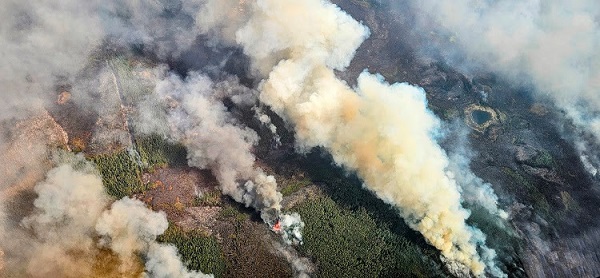Alberta
Preparation, swift response define wildfire season

Aerial view of wildfires near Fox Lake and Garden River in July.
Alberta concludes its 2024 wildfire season with renewed resilience, as vigilance and swift action helped keep communities safe and ready for the future.
Through effective investments, including a historic $155-million wildfire base budget, Alberta’s government ensured the province was prepared to respond throughout the 2024 wildfire season. In anticipation of the wildfire season, Alberta’s government recruited 100 additional wildland firefighters and an additional 40 contract wildland firefighters – in addition to securing more airtankers, heavy equipment, and helicopters equipped with night vision technology. As a result of this preparation, front-line crews were able to respond quickly and fight fires around the clock, containing 85 per cent of wildfires within 24 hours of detection.
“While the 2024 wildfire season was challenging, our coordinated efforts and the resilience of Albertans have been crucial in mitigating the impact. We will continue to adapt and strengthen our wildfire management strategies to protect our communities and natural resources.”
“This wildfire season has tested our resolve, especially in areas like Fox Lake and Jasper. The coordinated efforts of our firefighters and support teams were instrumental in protecting our communities. We will build on this experience to continue to improve response strategies and initiate new strategies to ensure the safety of all Albertans.”
The 2024 wildfire season began earlier than usual, with 64 carryover wildfires stemming from a mild winter and extremely dry conditions. In response to this elevated danger, Alberta’s government activated an early start to the wildfire season on February 20, 2024, implementing a fire ban and fire permit system to prevent additional human-caused wildfires.
Despite significant challenges, including large wildfires near Jasper that led to evacuations and the tragic loss of an Alberta wildland firefighter, as well as the loss of homes and businesses in the community, Alberta Wildfire demonstrated remarkable coordination, offering immediate aid and resources to Parks Canada, including support personnel, firefighters, aircraft and equipment.
While supporting the Jasper response led by Parks Canada, Alberta Wildfire crews continued to tackle substantial wildfires throughout the province, deploying personnel, aircraft and equipment to combat wildfires and assist impacted communities. Throughout the season, residents of Garden River, John D’Or Prairie, Fox Lake in the Little Red River Cree Nation, and the Chipewyan Cree Nation were also evacuated. Additionally, an area near Peace River and four neighborhoods in Fort McMurray faced short-term evacuations due to wildfires.
“In the wake of the heartbreaking loss from the Jasper wildfire, we are reminded of the strength found in collaboration – with each other and among all orders of government. We are reminded also of the compelling need to invest together in training, preparation, mitigation and adaptation, ensuring that we not only respond effectively, but that we also build a more resilient future.”
“The 2024 wildfire season underscored the importance of early planning and preparation. Investments in people, resources and new technology proved invaluable in our response efforts.”
During the 2024 wildfire season, Alberta Wildfire responded to more than 1,210 wildfires in the Forest Protection Area, exceeding last year’s record-breaking total. While the number of fires in 2024 exceeded the total number of fires in 2023, wildfires this season burned less than a third of the area compared with 2023, underscoring the effectiveness of Alberta’s preparation and investments.
Although Oct. 31 marks the end of Alberta’s wildfire season, Alberta Wildfire remains vigilant and ready to respond to any potential wildfires across the province.
Quick Facts
- Alberta Wildfire responded to more than 1,210 wildfires this year with more than 705,000 hectares burned.
- In 2023, there were 1,080 wildfires and more than 2.2 million hectares burned.
- Alberta Wildfire had almost 1,900 firefighters, contractors and support staff working on Alberta’s provincial response.
- Alberta Wildfire also received assistance from other agencies with more than 1,300 firefighters and support staff arriving from around the world to assist.
- While most wildfires were caused by people, we had 410 lightning-caused wildfires in July, the highest number in 20-years.
Related information
Alberta
Big win for Alberta and Canada: Statement from Premier Smith

Premier Danielle Smith issued the following statement on the April 2, 2025 U.S. tariff announcement:
“Today was an important win for Canada and Alberta, as it appears the United States has decided to uphold the majority of the free trade agreement (CUSMA) between our two nations. It also appears this will continue to be the case until after the Canadian federal election has concluded and the newly elected Canadian government is able to renegotiate CUSMA with the U.S. administration.
“This is precisely what I have been advocating for from the U.S. administration for months.
“It means that the majority of goods sold into the United States from Canada will have no tariffs applied to them, including zero per cent tariffs on energy, minerals, agricultural products, uranium, seafood, potash and host of other Canadian goods.
“There is still work to be done, of course. Unfortunately, tariffs previously announced by the United States on Canadian automobiles, steel and aluminum have not been removed. The efforts of premiers and the federal government should therefore shift towards removing or significantly reducing these remaining tariffs as we go forward and ensuring affected workers across Canada are generously supported until the situation is resolved.
“I again call on all involved in our national advocacy efforts to focus on diplomacy and persuasion while avoiding unnecessary escalation. Clearly, this strategy has been the most effective to this point.
“As it appears the worst of this tariff dispute is behind us (though there is still work to be done), it is my sincere hope that we, as Canadians, can abandon the disastrous policies that have made Canada vulnerable to and overly dependent on the United States, fast-track national resource corridors, get out of the way of provincial resource development and turn our country into an independent economic juggernaut and energy superpower.”
Alberta
Energy sector will fuel Alberta economy and Canada’s exports for many years to come

From the Fraser Institute
By any measure, Alberta is an energy powerhouse—within Canada, but also on a global scale. In 2023, it produced 85 per cent of Canada’s oil and three-fifths of the country’s natural gas. Most of Canada’s oil reserves are in Alberta, along with a majority of natural gas reserves. Alberta is the beating heart of the Canadian energy economy. And energy, in turn, accounts for one-quarter of Canada’s international exports.
Consider some key facts about the province’s energy landscape, as noted in the Alberta Energy Regulator’s (AER) 2023 annual report. Oil and natural gas production continued to rise (on a volume basis) in 2023, on the heels of steady increases over the preceding half decade. However, the dollar value of Alberta’s oil and gas production fell in 2023, as the surging prices recorded in 2022 following Russia’s invasion of Ukraine retreated. Capital spending in the province’s energy sector reached $30 billion in 2023, making it the leading driver of private-sector investment. And completion of the Trans Mountain pipeline expansion project has opened new offshore export avenues for Canada’s oil industry and should boost Alberta’s energy production and exports going forward.
In a world striving to address climate change, Alberta’s hydrocarbon-heavy energy sector faces challenges. At some point, the world may start to consume less oil and, later, less natural gas (in absolute terms). But such “peak” consumption hasn’t arrived yet, nor does it appear imminent. While the demand for certain refined petroleum products is trending down in some advanced economies, particularly in Europe, we should take a broader global perspective when assessing energy demand and supply trends.
Looking at the worldwide picture, Goldman Sachs’ 2024 global energy forecast predicts that “oil usage will increase through 2034” thanks to strong demand in emerging markets and growing production of petrochemicals that depend on oil as the principal feedstock. Global demand for natural gas (including LNG) will also continue to increase, particularly since natural gas is the least carbon-intensive fossil fuel and more of it is being traded in the form of liquefied natural gas (LNG).
Against this backdrop, there are reasons to be optimistic about the prospects for Alberta’s energy sector, particularly if the federal government dials back some of the economically destructive energy and climate policies adopted by the last government. According to the AER’s “base case” forecast, overall energy output will expand over the next 10 years. Oilsands output is projected to grow modestly; natural gas production will also rise, in part due to greater demand for Alberta’s upstream gas from LNG operators in British Columbia.
The AER’s forecast also points to a positive trajectory for capital spending across the province’s energy sector. The agency sees annual investment rising from almost $30 billion to $40 billion by 2033. Most of this takes place in the oil and gas industry, but “emerging” energy resources and projects aimed at climate mitigation are expected to represent a bigger slice of energy-related capital spending going forward.
Like many other oil and gas producing jurisdictions, Alberta must navigate the bumpy journey to a lower-carbon future. But the world is set to remain dependent on fossil fuels for decades to come. This suggests the energy sector will continue to underpin not only the Alberta economy but also Canada’s export portfolio for the foreseeable future.
-

 Business2 days ago
Business2 days agoCalifornia planning to double film tax credits amid industry decline
-

 2025 Federal Election8 hours ago
2025 Federal Election8 hours agoCanada Continues to Miss LNG Opportunities: Why the World Needs Our LNG – and We’re Not Ready
-

 Catherine Herridge2 days ago
Catherine Herridge2 days agoFBI imposed Hunter Biden laptop ‘gag order’ after employee accidentally confirmed authenticity: report
-

 COVID-191 day ago
COVID-191 day agoTrump’s new NIH head fires top Fauci allies and COVID shot promoters, including Fauci’s wife
-

 Business2 days ago
Business2 days agoB.C. Credit Downgrade Signals Deepening Fiscal Trouble
-

 2025 Federal Election1 day ago
2025 Federal Election1 day agoWill Four More Years Of Liberals Prove The West’s Tipping Point?
-

 Freedom Convoy1 day ago
Freedom Convoy1 day agoFreedom Convoy leaders Tamara Lich, Chris Barber found guilty of mischief
-

 Business1 day ago
Business1 day agoTrump’s ‘Liberation Day’ – Good News for Canadian Energy and Great News for WCSB Natural Gas







